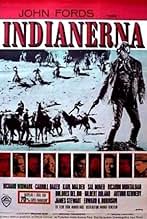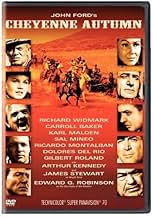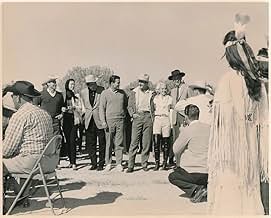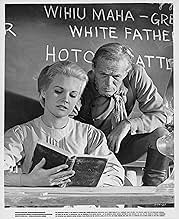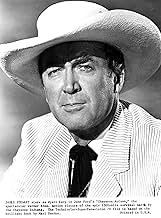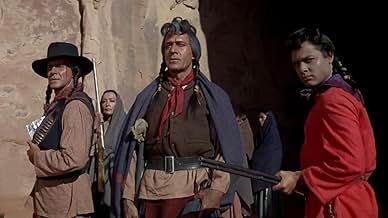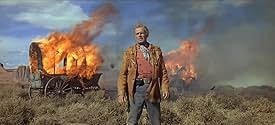IMDb RATING
6.7/10
6.8K
YOUR RATING
The Cheyenne, tired of broken U.S. government promises, head for their ancestral lands but a sympathetic cavalry officer is tasked to bring them back to their reservation.The Cheyenne, tired of broken U.S. government promises, head for their ancestral lands but a sympathetic cavalry officer is tasked to bring them back to their reservation.The Cheyenne, tired of broken U.S. government promises, head for their ancestral lands but a sympathetic cavalry officer is tasked to bring them back to their reservation.
- Director
- Writers
- Stars
- Nominated for 1 Oscar
- 1 win & 3 nominations total
Dolores Del Río
- Spanish Woman
- (as Dolores Del Rio)
Elizabeth Allen
- Guinevere Plantagenet
- (as Betty Ellen)
- Director
- Writers
- All cast & crew
- Production, box office & more at IMDbPro
Featured reviews
I rediscovered "Cheyenne Autumn" recently and must confess to finding the temptation to hail it as almost the greatest of the John Ford Westerns irresistable. I say "almost" as I realise that the claim needs a certain amount of caution. When set beside the formal perfection of "The Searchers", "My Darling Clementine" and even "She Wore a Yellow Ribbon", "Cheyenne Autumn" has a few weak moments and certainly some longeurs. And yet it has a monumental sweep that somehow outstrips them all. Ford's final Western is an apologia for the white Americans' treatment of the American Indian and his own depiction of them as the bad guys in so much of his previous work. Here the Cheyenne are the victims of White oppression, forced to live far to the south of their natural homeland and desperate to return. Depleted in number mainly through illness and starvation they set out on the long trek north, beset on all sides by alien landscape conditions and the American cavalry in pursuit. These pathetic remnants of a once noble tribe now consist of little more than a group of women and children - very few of the male warriors are left - accompanied by a white Quaker woman who has befriended them. One American cavalry officer (Richard Widmark in one of his best performances) recognises their dilemma and does all he can to summon official awareness of their plight. In a sense this is one of the finest of all road movies, the protagonists forced to face the long journey home across a seemingly endless wilderness. Only through an inner determination are the remnants of the tribe able to make it. It is also one of cinema's most powerful documentations of man's inhumanity to man, not light years away from "Come and See" and Ford's own "The Prisoner of Shark Island". The film is badly flawed by the intrusion of a semi-comic interlude depicting Wyatt Earp and Doc Holliday more intent on card play in Dodge City than in what is happening around them. This only serves to slow the pace of a film that is often prone to encompass peripheral detail to the detriment of moving purposefully forward. But who can quibble when the end result encompasses one magnificent image after another in William Clothier's splendid 'scope photography and the only music score - by Alex North - that ever did real justice to a Ford picture. For once we actually get away from those endless medleys of sentimental hymn and folk melodies with an astringency of style that matches the serious content of the film.
The first half hour of Cheyenne Autumn promises a moving western akin to How the West Was Won. There's a great romance, family tensions, and a large promise broken to the Native Americans. When the white government officials promise to meet the Indian chiefs and discuss the terms of an already broken treaty, everyone in the tribe walks the great distance to the white settlement. They stand for hours in the sun, waiting in vain. It's very sad, but it starts off a compelling drama. Richard Widmark is in love with a Quaker schoolteacher, Carroll Baker, and he writes her an absolutely adorable marriage proposal on the chalkboard of her classroom. Since he loves her, he wants her to leave for safety instead of traveling with the Indians to the new territory.
The rest of the long movie really disappoints. I tried to forgive the bad casting of Carroll as a Quaker, but she certainly didn't act like an unworldly woman. Karl Malden gave his usual intense, penetrating stare, but little else. Ricardo Montalban and the remarkably well-preserved Gilbert Roland play Native Americans; you'd think that by 1964 Hollywood would stop putting dark makeup on actors. Sal Mineo, also playing an Indian, strutted around with his shirt off to impress a tribal girl - but that made no sense, since Native Americans always ran around bare-chested. Why were there blushes and giggles exchanged? And randomly, there was a chunk of time in the middle of the movie that included Wyatt Earp (played by James Stewart) and Doc Holliday (played by Arthur Kennedy) in a saloon playing poker. They don't add to the story, and there's no acting required. Jimmy throws a few winks among his jokes, and Arthur keeps up. I can't imagine why this comic relief section was included in this drama. Edward G. Robinson also has a small role in the movie. Can't imagine him in a western? He plays a government official, so no cowboy hat for him. Keep an eye out for cutie pie Patrick Wayne, though, which is fun.
This movie is very long, and at times it does drag. The middle section is uneven, and after a while, you forget how the beginning even started. If you watch it, it won't hurt you, but it's not as good as it seems.
The rest of the long movie really disappoints. I tried to forgive the bad casting of Carroll as a Quaker, but she certainly didn't act like an unworldly woman. Karl Malden gave his usual intense, penetrating stare, but little else. Ricardo Montalban and the remarkably well-preserved Gilbert Roland play Native Americans; you'd think that by 1964 Hollywood would stop putting dark makeup on actors. Sal Mineo, also playing an Indian, strutted around with his shirt off to impress a tribal girl - but that made no sense, since Native Americans always ran around bare-chested. Why were there blushes and giggles exchanged? And randomly, there was a chunk of time in the middle of the movie that included Wyatt Earp (played by James Stewart) and Doc Holliday (played by Arthur Kennedy) in a saloon playing poker. They don't add to the story, and there's no acting required. Jimmy throws a few winks among his jokes, and Arthur keeps up. I can't imagine why this comic relief section was included in this drama. Edward G. Robinson also has a small role in the movie. Can't imagine him in a western? He plays a government official, so no cowboy hat for him. Keep an eye out for cutie pie Patrick Wayne, though, which is fun.
This movie is very long, and at times it does drag. The middle section is uneven, and after a while, you forget how the beginning even started. If you watch it, it won't hurt you, but it's not as good as it seems.
I have recently seen again "Cheyenne Autumn", and, perhaps, I finally got it. In my opinion, this film represents the desperation of an artist, the director John Ford. Forget the usual stunning beauty of the cinematography, the accuracy in filming action scenes, the care for poetic details, and all Ford's trade-mark style. We readily see that "Cheyenne Autumn" is completely different from any other western movie, and not only from the remainder of Ford's work.
Compared with other western movies, the main difference and innovation is that here any killed man is a REAL tragedy, that exhaustion, famine, cold, violence are REAL sufferings for the miserable people on the screen (not just for the Cheyennes, even for the whites). And all that is shown us by Ford ruthlessly, uncompromisingly. The fact that the director stands for the Indians is not as much innovative as it seems. All along his career Ford showed respect and sympathy for them. In the finale, just after an apparent happy ending, we have again violence, again a murder, again a distressed mother: we almost feel the same grief of hers. It is somewhat ironic that in the same year the film was made, 1964, the fashion of Italian western movies invaded the world of cinema, with furious, acrobatic gun-fights and hundreds of shot-dead people, like in a sort of funny game.
The movie is split into two parts by a comic interlude, the episode placed in Dodge City, which is actually a farce. I think that Ford wanted to pay a homage and bid his personal farewell to the old silent western-movies of the 1920s, when his career started. The funny situations are deliberately over the top: see the sensational, licentious joke, when Wyatt Earp (Jimmy Stewart) realizes that he actually had met the girl in Wichita... In any case, a somewhat gloomy mood permeates even this comic part. The main characters are all aged, grey-haired and seemingly life-weary. And the episode is introduced by a particularly brutal, cruel murder.
I think that "Cheyenne Autumn" is a beautiful film, with a good story, great visual beauties, and, in particular, an excellent acting by the whole cast. But it is tough for me to face John Ford's desperate vision. After all, what I most like in the movie is to see, once again, Ben Johnson and Harry Carey Jr on horse-back, in their blue uniforms (by the way: why are they uncredited?). They are both aged and bulkier compared with their look in the great Ford's western-epics of their youth. Never mind: they are almost dearer to me for this very reason...
Compared with other western movies, the main difference and innovation is that here any killed man is a REAL tragedy, that exhaustion, famine, cold, violence are REAL sufferings for the miserable people on the screen (not just for the Cheyennes, even for the whites). And all that is shown us by Ford ruthlessly, uncompromisingly. The fact that the director stands for the Indians is not as much innovative as it seems. All along his career Ford showed respect and sympathy for them. In the finale, just after an apparent happy ending, we have again violence, again a murder, again a distressed mother: we almost feel the same grief of hers. It is somewhat ironic that in the same year the film was made, 1964, the fashion of Italian western movies invaded the world of cinema, with furious, acrobatic gun-fights and hundreds of shot-dead people, like in a sort of funny game.
The movie is split into two parts by a comic interlude, the episode placed in Dodge City, which is actually a farce. I think that Ford wanted to pay a homage and bid his personal farewell to the old silent western-movies of the 1920s, when his career started. The funny situations are deliberately over the top: see the sensational, licentious joke, when Wyatt Earp (Jimmy Stewart) realizes that he actually had met the girl in Wichita... In any case, a somewhat gloomy mood permeates even this comic part. The main characters are all aged, grey-haired and seemingly life-weary. And the episode is introduced by a particularly brutal, cruel murder.
I think that "Cheyenne Autumn" is a beautiful film, with a good story, great visual beauties, and, in particular, an excellent acting by the whole cast. But it is tough for me to face John Ford's desperate vision. After all, what I most like in the movie is to see, once again, Ben Johnson and Harry Carey Jr on horse-back, in their blue uniforms (by the way: why are they uncredited?). They are both aged and bulkier compared with their look in the great Ford's western-epics of their youth. Never mind: they are almost dearer to me for this very reason...
The Cheyenne nation has been gathered on their desert reservation waiting for supplies. The people are starving. Captain Thomas Archer (Richard Widmark) is sympathetic but powerless in the face of government indifference. Deborah Wright (Carroll Baker) is a Quaker trying to help the Cheyenne. Chiefs Little Wolf (Ricardo Montalban) and Dull Knife (Gilbert Roland) lead over 300 Cheyenne from their reservation in the Oklahoma territory to their traditional home in Wyoming. Archer is forced to stop them. The media exaggerate army casualties. Secretary of the Interior Carl Schurz (Edward G. Robinson) resists political pressure to increase the conflict.
This starts off well with the vast landscape and compelling story of the Cheyenne mistreatment. Director John Ford is able to give dignity to the movie. Even with the mostly Latinos portraying Cheyennes, it isn't that badly done. There is some good action. It's set up for a serious compelling western. It is a somewhat long march. It's meandering and struggles to keep up the pace. Then it takes a bad comedy detour in Dodge City. Other than having James Stewart play Wyatt Earp, there is nothing worthwhile in that section. The tone is all wrong and breaks down the realism of the movie once and for all.
This starts off well with the vast landscape and compelling story of the Cheyenne mistreatment. Director John Ford is able to give dignity to the movie. Even with the mostly Latinos portraying Cheyennes, it isn't that badly done. There is some good action. It's set up for a serious compelling western. It is a somewhat long march. It's meandering and struggles to keep up the pace. Then it takes a bad comedy detour in Dodge City. Other than having James Stewart play Wyatt Earp, there is nothing worthwhile in that section. The tone is all wrong and breaks down the realism of the movie once and for all.
Historical and overlong movie recounting the legendary Cheyenne trek led by the Indian chiefs , Little Wolf and Dull Knife . The picture is an epic portrait of the historic story about celebrated Cheyenne (they are actually Navajo , telling dirty jokes in their native tongue) and their legendary feat leading the tribe on a journey to freedom , uprooting them from the Yellowstone and resettling them in distant Oklahoma . This majestic flick illustrates the callous disregard with which the government treated the Cheyenne in the 1880s as the US agency fails to deliver even the meager provisions due by peace treaty to the stubborn tribe in their stark desert reserve without proper supplies for survival ; then the starving Indians have taken more abuse than it's worth and break it too by embarking on a 1,500 miles trek back to their ancestral hunting grounds , being led by Little Wolf and Dull Knife (Ford was urged by producers to cast first stars as Richard Boone and Anthony Quinn , as both had Native American blood ; however , Ricardo Montalban and Gilbert Roland, who were of Mexican descent , were cast instead) . Meanwhile , proud Cheyenne tribe square off US cavalry commanded by Thomas Archer (Richard Widmark) who leads his army on a wild chase across the barren plains in this saga of the old west . Red Shirt (played by Sal Mineo , though John Ford would not allow him to speak any English dialog in the picture due to the actor's Bronx accent) , a rebel Indian does the first shot against cavalry . Captain Thomas Archer goes to deal with Secretary of Interior Schulz about the unfortunate Indians (Spencer Tracy was first cast , but had a stroke and was replaced by Edward G. Robinson, , including the background had to be done with screen process and whose scenes were entirely photographed in studios) , taking place a climatic meeting scene between Shultz and the Cheyenne chiefs . The tribe refuses to surrender in this chronicle of a bitter fight between the tribe and the US cavalry in the struggle for the west . Now the mightiest true adventure of all! Filmed by 6-time Academy Award winner John Ford...with a massive all-star cast! .1,500 miles of heroism and incredible adventure!
This sprawling epic film displays Western action , shootouts , drama and spectacular battles . It's a thoughtful piece for its time that had an original tragic ending and imbued with moments of sensitive poetry . This nice Western contains interesting characters , full of wide open space and dramatic moments . This classic , sturdy picture ranks as one of the most sentimental of John Ford's work . Thought-provoking , enjoyable screenplay portraying in depth characters and brooding events with interesting issues running beneath script surface and suggested by Mari Sandoz in "Cheyenne Autumn¨ with screenplay by James R. Webb and based on a novel titled Last Frontier by Howard Fast who also wrote Spartacus . This excellent film featuring a magnificent performance by the whole main cast , including a top-notch supporting cast . Awesome Richard Widmark in a larger-than-life character along with a gorgeous Carrol Baker and a magnificent Karl Malden as deranged captain Wessels . In the film appears , as usual , Ford's favourite actors such as : Ben Johnson , Harry Carey Jr. , Mike Mazurki , George O'Brien , Mae Marsh , Patrick Wayne , Dolores Del Rio , Ken Curtis , Elizabeh Allen , Willis Bouchey , and , of course , James Stewart as obstinate sheriff Earp . Ford added the segment with Stewart in place of an intermission , in spite of the film was overlong , and so he came up with the Wyatt Earp segment , giving Stewart an awesome interpretation , as usual . Outdoors are pretty gorgeous and well photographed in Super Panavision 70mm by William H. Clothier , Ford's regular , and filmed on location in Moab, Utah ,Fort Laramie, Wyoming, Monument Valley, Utah , Gunnison Canyon , Colorado . Rousing and an impressive musical score by Alex North who composed other masterpieces as Spartacus and Cleopatra.
This may not be Ford's best Western , as many would claim , but it's still head ad shoulders above most big-scale movies . You'll find the ending over-dramatic according to your tastes , though it's lovingly composed by John Ford who really picks up battle , drama and sensibility towards the ending . Rating : Better than average , worthwhile watching . The motion picture well produced by Bernard Smith was brilliantly directed by John Ford at his last film . This powerful movie will appeal to Indian Western fans .
This sprawling epic film displays Western action , shootouts , drama and spectacular battles . It's a thoughtful piece for its time that had an original tragic ending and imbued with moments of sensitive poetry . This nice Western contains interesting characters , full of wide open space and dramatic moments . This classic , sturdy picture ranks as one of the most sentimental of John Ford's work . Thought-provoking , enjoyable screenplay portraying in depth characters and brooding events with interesting issues running beneath script surface and suggested by Mari Sandoz in "Cheyenne Autumn¨ with screenplay by James R. Webb and based on a novel titled Last Frontier by Howard Fast who also wrote Spartacus . This excellent film featuring a magnificent performance by the whole main cast , including a top-notch supporting cast . Awesome Richard Widmark in a larger-than-life character along with a gorgeous Carrol Baker and a magnificent Karl Malden as deranged captain Wessels . In the film appears , as usual , Ford's favourite actors such as : Ben Johnson , Harry Carey Jr. , Mike Mazurki , George O'Brien , Mae Marsh , Patrick Wayne , Dolores Del Rio , Ken Curtis , Elizabeh Allen , Willis Bouchey , and , of course , James Stewart as obstinate sheriff Earp . Ford added the segment with Stewart in place of an intermission , in spite of the film was overlong , and so he came up with the Wyatt Earp segment , giving Stewart an awesome interpretation , as usual . Outdoors are pretty gorgeous and well photographed in Super Panavision 70mm by William H. Clothier , Ford's regular , and filmed on location in Moab, Utah ,Fort Laramie, Wyoming, Monument Valley, Utah , Gunnison Canyon , Colorado . Rousing and an impressive musical score by Alex North who composed other masterpieces as Spartacus and Cleopatra.
This may not be Ford's best Western , as many would claim , but it's still head ad shoulders above most big-scale movies . You'll find the ending over-dramatic according to your tastes , though it's lovingly composed by John Ford who really picks up battle , drama and sensibility towards the ending . Rating : Better than average , worthwhile watching . The motion picture well produced by Bernard Smith was brilliantly directed by John Ford at his last film . This powerful movie will appeal to Indian Western fans .
Did you know
- GoofsThe Navajos travel 1500 miles but never seem to leave Monument Valley, except for some snow scenes.
- Quotes
Secretary of the Interior: Oh, Henry... you and I fought together at Gettysburg. You had never seen a Negro slave. All you ever knew was that they were human beings with the rights of human beings - and it was worth an arm to you.
- Alternate versionsMany television prints run 145 minutes, and omit the scene with James Stewart as Wyatt Earp. The video release is the full 154-minute version.
- ConnectionsEdited into Film socialisme (2010)
- How long is Cheyenne Autumn?Powered by Alexa
Details
- Release date
- Country of origin
- Language
- Also known as
- El ocaso de los cheyenes
- Filming locations
- Production company
- See more company credits at IMDbPro
Box office
- Budget
- $4,200,000 (estimated)
- Gross worldwide
- $10,980
- Runtime
- 2h 34m(154 min)
- Aspect ratio
- 2.20 : 1
Contribute to this page
Suggest an edit or add missing content



